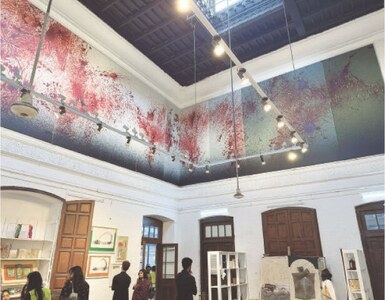Shamsal, who asked her real name not be used, was compelled to migrate from Turbat in Kech, to Quetta just to be able to study in peace.
But her troubles didn’t end there as she “faced financial constraints and constant distractions after leaving my hometown,” she says.
According to data from the 2017 census, Kech district had the highest literacy rate of 62.66 percent in the province, followed by Panjgur at 59.22 percent, and Quetta at 58.76 percent. Yet, the sole public library in the city was non-functional, and Shamsal’s home was not conducive for studying, its atmosphere often disrupted by various domestic disturbances.
She moved at least 750 kilometres to Quetta so she could study in a library, albeit private.
Kech district, situated in an underserved part of Balochistan, grapples with a significant shortage of libraries — public and private — and educational support, creating a challenging learning environment for many students.
Students in Turbat have to face numerous difficulties due to a lack of libraries in an underdeveloped part of Balochistan
The district authority shut down the single public library between January 1, 2021 to June 16, 2023 due to structural faults in the building. Private libraries have never been established in Turbat city and students had no choice but to go to other cities to find suitable spaces to study.
Before the library’s closure, they could study during its operational hours between 9am and 7pm which, they say, gave them ample time to work in a peaceful environment. Since re-opening however, it has revised its hours from 9am to 4pm, which is inconvenient for a lot of students.
Fahad Baloch, pursuing a Master’s in international relations, says, “These libraries often operate on fixed schedules that may not align with students’ study preferences, especially those preparing for competitive exams or holding part-time jobs. This limits their access to library resources during their preferred study times.”
While they may be able to travel to other cities, they face different challenges once there. “Living in hostels is especially challenging for female students like us,” says Hani Mehr, a 2021 graduate of Turbat University.

Mehr was aspiring to pass the civil service exam for which she went the extra mile in search of a conducive study environment. She went first to Quetta and then found her way to Lahore, despite the huge financial burden it placed on her father, a school van-driver. She says she would return home if she had the facilities to help her achieve her goals.
Nazish Nazeer, 25, a medical student, echoes Mehr’s experience. “If we have academies or centres where we can prepare for medical exams or libraries in our hometown, we won’t need to come to Quetta, as it is challenging for a female student to be far from her family,” she says.
The scarcity of libraries in a city like Turbat continues to hinder students from studying comfortably and with ease.
Shakeel Phullan, an LLB student from Turbat University, says, “I continue to face daily challenges while studying in a library that lacks essential facilities such as internet connectivity, access to resources, adequate water supply, and reliable electricity.”
He also questions the lack of proactive measures by the district education department and the municipal administration to establish more libraries in a densely populated city like Turbat.
Anayat Khuda Bakhsh, the former director of Dynamic English Learning Teaching Academy in Turbat, is a strong advocate for the establishment of private libraries in Kech.
“Such libraries could also bridge educational disparities and ensure equal opportunities for students from various socio-economic backgrounds, ensuring that knowledge and opportunities are accessible to all.”
He says students face difficulties due to the limited “collection of educational materials, including textbooks, reference books, and academic journals” in the public library. “This limitation significantly hampers their ability to engage in in-depth study, conduct comprehensive research and expand their knowledge base, ultimately affecting the quality of their education.”
Another significant challenge stems from the inconvenience associated with travel and study environments. Many students, particularly those residing in remote areas, face long and arduous journeys to reach the city centre, where the public library is located. The costs, in terms of both time and transportation expenses, can be prohibitive, discouraging regular visits.
Even when students do manage to reach the library, they may encounter a shortage of suitable study spaces, further hindering their ability to focus and study effectively.
Khuda Bakhsh, believes the lack of private libraries perpetuates educational inequalities. Students with limited resources or those residing in remote areas may struggle to access the same educational materials as their peers with better library access.
This unequal distribution of educational opportunities can exacerbate disparities in academic achievement, limiting the potential for upward mobility through education.
A teacher from the education department in Turbat, who asked not to be named, hopes both the federal and provincial governments will establish libraries in the city. Additionally, he advocates for the creation of competitive exam preparation academies within the city, ensuring that local graduates are not forced to travel to other cities.
The desire to learn is not the issue. The environment to do it in, is.
The writer holds an LLB Degree from the Department of Law at the University of Turbat.
X: @MunajGul
Published in Dawn, EOS, October 22nd, 2023



































